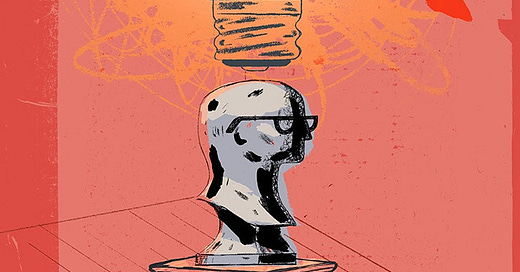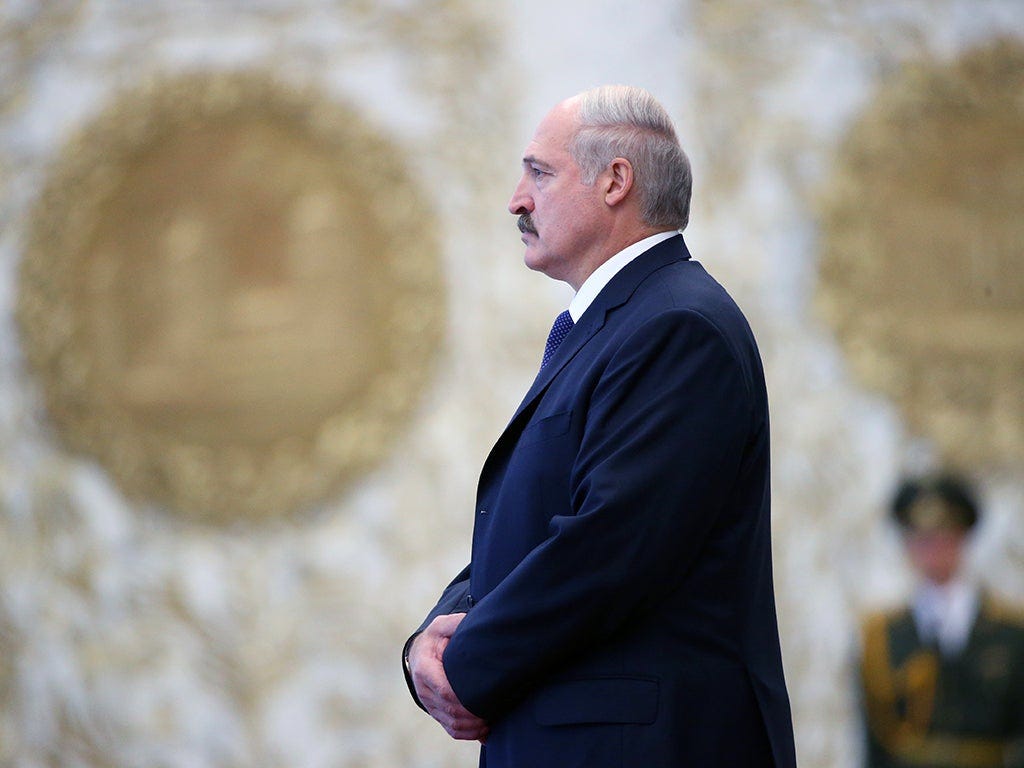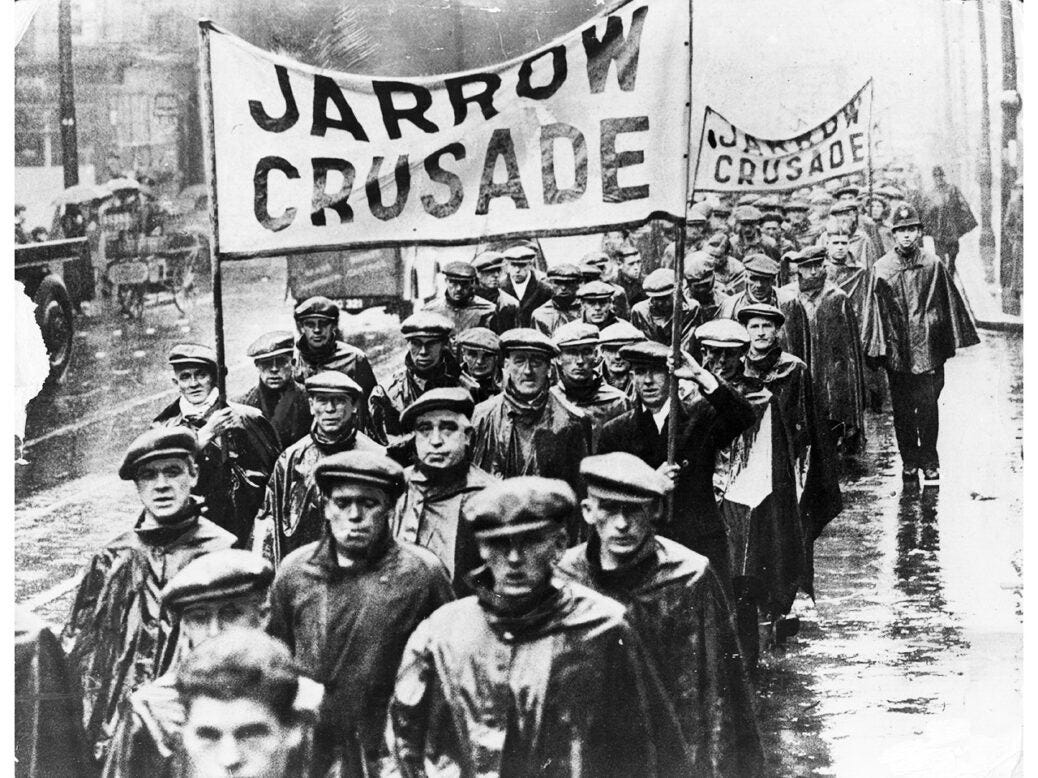The Saturday Read: Moranic men
Inside: Caitlin Moran, riots, Lukashenko, UBI, Springsteen, Hegel, and smart thinking.
Good morning, and welcome to the Saturday Read, the New Statesman’s weekly guide to the best writing on ideas, politics, books and culture. This is Harry, along with Will.
NB: If this email doesn’t load for you in full, you can view it online (or in app) by clicking on the button you see when your email cuts off. The email hasn’t ended until you reach Will’s sign-off. I highly recommend today’s.
If the pieces below intrigue, perhaps you’d like to try a trial subscription to the NS. Read three free articles after registering on our site. A digital subscription is just 95p a week. If you are already a subscriber, thank you for reading us. Let’s get to it.
1—“The first omen that Caitlin Moran’s new book What About Men? will be an outright catastrophe appears on page 13.”
At last, someone (Will) has examined the bewilderingly popular work of Caitlin Moran, whose writing feels increasingly like an outdated product of the 2010s. As one reader put it, Will’s piece, which flew online this week, “pronounced the last rites on The Long Cameron Era”. HL
The danger of an overwhelmingly ripe personal style is that it morphs into a substitute for thinking. (See: Morrissey.) Heavily stylised, What About Men? becomes thoughtless. Big old sexisms free-fall through the sky like meteorites. “Men don’t like things to change,” apparently. “Straight men flounder in the emotional desert of never being able to appreciate or support each other,” apparently.
Moran compares men and women with all the delicacy of Roy Chubby Brown musing on which foreign nationality smells the worst. Were two women to meet on a train to Euston, Moran writes, by the end of the journey they will be best friends forever, be able to write novels about each other’s vulvas and so on. Were two male cyclists to share a changing room, the best conversation they might have would involve grunting about the football. This is tired stuff, and unworthy of Moran’s talent, although as she does concede: “I speak in broad generalisations”.
2—“The pain will not be evenly shared.”
The Bank of England, as its former governor Mervyn King told me last year, made “a terrible mistake” during Covid: it started printing money (again), fuelling inflation. For our cover this week, Ed Conway takes us inside that decision – and captures the economic tumult it has created. HL
It was in the summer of 2021 that it first began to dawn on a small group of senior economists at the Bank of England that they might have erred, badly. Not that they would ever put it that way. In the rarefied world of central banking one mostly talks in riddles and rarely admits a serious error. But that summer, still in the thick of Covid, it was fast transpiring that there could be a problem.
We might be in a world of structurally higher inflation for some time. And Britain, which deindustrialised faster than any other developed nation, outsourcing heavy industry and opting instead to import an ever increasing fraction of its goods from overseas, just so happens to be more exposed to these effects. If the world finds itself mired in a stickier, higher inflation rate for years, Britain might find it harder than any other country to bring prices back down, as has been the case so far.
3—“The police are becoming a threat to democracy and the republic itself.”
Dider Fassin spent 15 months on patrol with the French police, where he witnessed the accelerating breakdown of the social contract between police officers and those living in housing estates, especially the young. As France was convulsed this week by protests that degenerated into riots, Slavoj Žižek asked the left to consider what might happen if those revolts degenerated even further, into open revolt. WL
The left shouldn’t be afraid to add to its tasks ensuring the safety of ordinary people: there are clear signs of the growing decay of manners, of youthful gangs terrorising public spaces, from stations to shopping malls. Mentioning this decay is often dismissed as reactionary, with the insistence that we must look at the “deeper social roots” of such phenomena, such as unemployment and institutional racism.
Yet if the left disregards public safety, it is conceding to the enemy an important domain of dissatisfaction that, in a time of anarchy, pushes people to the right. Everyday insecurity hurts the poor much more than the rich who live calmly in their gated communities.
4—“He was once accused of beating a tractor driver with a shovel for coming to work drunk.”
How did Alexander Lukashenko, a man who used to manage a pig farm, become the dictator of Belarus? And was he single-handedly responsible for defusing Yevgeny Prigozhin’s short-lived mutiny on 24 June? Katie Stallard has the answers. WL
While he is clearly revelling in the attention, Lukashenko’s role in defusing the Prigozhin mutiny has not diminished his dependence on Russia. At best, he has won some flattering headlines and reminded Putin of his utility.
In recent years Lukashenko has tried to keep Belarus isolated, Franak Viačorka explained, and to instil the message through the state propaganda apparatus that the outside world is chaotic, and Russia’s war is happening far away. “Well, he has just brought this reality to Belarus.”
5—“What would you do with an extra £1,600 a month?”
Paul Johnson of the Institute for Fiscal Studies calls it a “zombie idea”. But a universal basic income is being trialled in Jarrow: 15 people are being paid £19,200 a year for the next two years, no requirements attached. Anoosh reports. HL
It was here, 87 years ago, where 200 jobless men gathered on 5 October 1936 to journey to London in protest against poverty, after losing their shipyard and steelworks. In the Jarrow Marches, led by local Labour MP Ellen Wilkinson, they tramped down a soggy, depression-stricken England to parliament to demand work.
Today, that history is slouching towards an unlikely coda, in a social experiment offering Jarrovians pay for no work at all. Is a radical form of justice coming at last to what Wilkinson once declared “the town that was murdered?”
6—“Walsh had only one principle when hiring: people who were ‘intelligent before they were anything else’.”
Ed Smith, the England cricket team’s national selector from 2018 until 2021, has often written vividly on a scourge he sees across society: that of bureaucrats obsessed with process who stifle the talent around them. He has spotted the type – or the refreshing absence of it – in a new book on Bruce Springsteen. HL
In assembling his team, Springsteen had no interest in their “track record”. His manager had never been a manager before. The mixer on one of his records had never mixed a record in his life. The less attached they were to what they’d done before, the more he liked it. The slate was clean. What mattered was that they had talent and were “all in”.
“I was not interested in professionals. They like schedules. They like somebody who’s going to approach their work as a piece of work, and not very obsessively. I was into crafting an identity… I needed people who were going to be willing to go in as deep as I needed and was willing to go myself. Generally those are not professionals, just people who were passionate and had some skills.”
7—“Now the money men seem to have taken up rationalism too.”
Don’t even think about taking a Malcolm Gladwell book to the beach this summer. Or at least, not until you’ve read this stinging critique of so-called ‘smart thinking’ books by Josiah Gogarty. WL
Smart thinking is a strange sort of book classification. It doesn’t really connote an established genre, like history, biography or poetry. (Is the implication that all of those are the product of stupid thinking?) But you know it when you see it. Outside of its dedicated habitat, smart thinking is found on the shelves at airport WHSmith’s, and on the beaches that people fly to after, presumably, buying books at airport WHSmith’s. Not everyone thinks that smart thinking is smart – one alternative description I’ve heard is “the stupid person’s clever book”.
8—“Rebellion quickly becomes a habit.”
If you, like me (Harry), are no fan of the SNP, its current implosion is a joy to watch. Chris Deerin, our Scotland editor, breaks it down. HL
It takes a certain kind of leader to demand unity in a political party and get it. Margaret Thatcher, Tony Blair and Nicola Sturgeon had the right stuff. They were serial winners, with commanding personalities and a clear vision, around which their tribes could cohere.
Characters like these are rare, though. It’s why they stand out, and why they remain constant reference points. In particular, those who succeed them tend to struggle, as small boats do when caught in the wake of an ocean liner. The latter, who grab the ball when it comes loose from the scrum and spend their time desperately trying not to drop it, is a more familiar type in our politics: John Major, say, Ed Miliband or Theresa May. All had their talents, but none ever really convinced. Therefore they operated under the permanent Damoclean threat of mutiny and defenestration.
Click below to sign up to our political email, primarily written by Freddie Hayward, and sent Monday through Friday:
9—“The New York Times’s withering editorial did not use the word ‘Asian’ once.”
Yuan Yi Zhu exposes the unspoken reality of affirmative action, which the US Supreme Court, now dominated by Republican-appointed justices, has just struck down. Progressives, writes Yuan, were happy to uphold one form of discrimination for another – against Asian Americans. (Complement Yuan’s piece with this, by Nick Burns.) HL
Growing up as an ethnically Chinese teenager in Canada, I knew, as did all my peers who were similarly afflicted by that incurable condition, that being Asian would count against you when you applied to certain university programmes, and that you had to do better than your non-Asian classmates to stand an equal chance of being admitted.
As I recall, most of us simply accepted this as the natural order of things, and chose one of two strategies to overcome the hereditary handicap. Some doubled down and studied harder. Others opted to consciously behave in ways that were “less Asian”. Playing classical instruments was racially suspect; becoming involved in local politics, on the other hand, helped demonstrate qualities of leadership, which the conformist Asians are said to lack.
10—“We can’t produce artificial intelligence without also producing artificial life.”
Have we finally built a machine that can think? That’s the question Jensen Suther asks in this fascinating essay, which takes in the latest developments in AI and complements them with a healthy dose of Hegel. WL
The history of philosophy throws up a potential roadblock on the much-trumpeted march of AI towards human-like intellect. Such challenges are nothing new; in 1972 Hubert Dreyfus published What Computers Can’t Do, a landmark book that drew on Wittgenstein and Heidegger to show that AI research at the time misunderstood what intelligence is.
But another improbable protagonist – the 19th-century German philosopher GWF Hegel – goes beyond these attempts, despite having lived and died over 100 years earlier. Hegel developed an explosive account of the relationship between life and mind that overcomes the limitations of Dreyfus’s “critique of artificial reason” and furnishes a new yardstick against which any purported AI must be measured.
Will’s Best of the Rest
WSJ: The West (re)learns that wars require industry. Who knew that bombs were made in factories!
Politico: Britain’s expensive ex-PMs. Surely John Major can look after himself by this point?
Daily Mail: The White House cocaine mystery. You think it was Hunter but it probably wasn’t.
Zadie Smith: Did I kill Charles Dickens? She couldn’t even if she wanted to.
Edward Luce: The moral bankruptcy of Ivy League America.
Miriam Cates: Labour wants to nationalise our kids.
Evgeny Morozov: The real danger of AI.
Rebecca Traister: Robert F Kennedy Jr’s inside job.
Barbie house (human scale) on Airbnb. Harry has booked this out for every week in August.
Elsewhere on the NS
Are the kids alright, asks Melissa Denes, or are they really, really irritating? It’s a question that gets to the heart of the intergenerational debates that are roiling feminism. “Killing the kids, like killing Mummy,” writes Denes, “turns out to be a hollow victory, because they were never really the enemy.”
Do not miss Channel 4’s Afghanistan documentary Evacuation, says Rachel Cooke. “Give it your time, let it rip open your heart. You won’t ever forget these testimonies.”
“Grief is hard to write about, for the same reasons the sea is hard to write about while you’re in it. But every so often, these last few days, I have heard a small, strange voice mutter, unbidden, the deeply childish phrase: ‘I want to go home.’ The problem is, the home I’m referring to isn’t a place or a building, but a feeling: a security bound up in the person who is gone and the life we were building together. The home I am longing for is a home which cannot now exist.” Jonn Elledge, a longtime contributor of ours, has written a brilliant, difficult and – as ever with Jonn – funny piece.
Will Dunn starts this column on the Bank of England in the most unexpected fashion. It works.
George Osborne always knew he was acting in the wrong, writes Jeevun Sandher.
Michael Lind dismantles a new book about capitalism – and wonders why so many classical liberals today are so much less pragmatic and worldly than their 19th-century forebears.
The commerce, scandal and violence of sport in the 1980s was a reflection of an increasingly individualist age, created by Thatcherism, writes Emma John.
Nicholas Lezard has written on the majesty of an Ashes summer. (Play starts in an hour. Australia are 116-4. We are one poor session away from losing the series.)
Ellen meets Anohni: “Having a conversation with Anohni is like listening to an emotionally intelligent philosopher searching for solutions to humankind’s greatest problems.”
How to get into: Dickens
Each week we ask someone to recommend three books as a way into a subject. This week we turned to Andrew Marr, our political editor. He turned to Dickens. (Zadie Smith has also filed on Dickens this week, as Will noted above: 2,700 words in the New Yorker on the anxiety of his influence on her.) Andrew writes:
Charles Dickens is the essential English novelist but often seems vulnerable to snobbery and incomprehension, sinking into the “more revered than read” category. That’s as bad as giving up on Shakespeare or Joyce. With the long summer reading months ahead, here’s some help.
The Artful Dickens: Tricks and Ploys of the Great Novelist by John Mullan (2020): A genuinely brilliant and witty guide to how Dickens did what he did, by Mullan, a professor of English at University College London. How did the great novelist get to those extraordinary names? How did he kill people off? Ghosts, weather, sex, the importance of reading him aloud – it’s all here.
Charles Dickens: Selected Journalism 1850-1870 edited by David Pascoe (1997): The easiest way to pick up the vigour, the energy, and the extraordinary eye of Dickens is through his journalism. This Penguin collection is the place to start.
David Copperfield by Charles Dickens (1850): If you don’t like this, you don’t like reading. And if you ever ask yourself whether it remains urgently relevant, turn next to Demon Copperhead, Barbara Kingsolver’s superb transposition of it into the opioid crisis of the modern Appalachians.
And with that…
There has never been a better time to be a man, at least not in what used to be called “developed countries”. (Britain does seem to be doing whatever the reverse of development is at the moment.) I’ve had to think about men – in the abstract – as I reviewed a new book about masculinity this week. Male complaints. Male anger. Male rights.
It’s a great job, finding a berth and whining about what it is like to be a man, something you are born into and cannot change (at least not without the number of someone on Harley Street). I watch them closely, these guys, these masculinity gurus. They complain about a “sexual marketplace” dominated by women – while evincing nothing less than a total naivety about matters of the night. (No, you do not need to look like a bodybuilder to get a girlfriend.) They whine about the number of men who end up in prison or commit suicide – while doing no campaigning to improve prison conditions, or anything sensible to improve male mental health.
The framing is always wrong. When you read up on this stuff, all the data and all the noise is crammed into one single narrative of decline, what Tom Wolfe referred to in a different context as The Great Slide. The question you have to ask is: decline from what exactly? A century ago I would have been a few years – if I was lucky – from a good four year stint in the trenches. (A place where, yes, only men were sent to fight and die.) One hundred years before that, if my family history is anything to go by, I would have been a coal miner.
Is this The Great Slide? I don’t believe in any cosmic, capital-P Progress. But I’m not stupid enough to think that life has not got better materially, at an individual level, for most men (and women) in the last 300 years. That matters, and it matters much more than whether some men are fed up with not matching with enough women on Tinder.
Thank you for reading. Don’t miss out – subscribe to the New Statesman and stay up to date with everything you need: from news and analysis to comment and criticism.
Whether you’re looking for a sharp blog or a finely written feature, the New Statesman has you covered. Have a good week, and catch you next Saturday.
Thanks to our colleague Chris Bourn.























